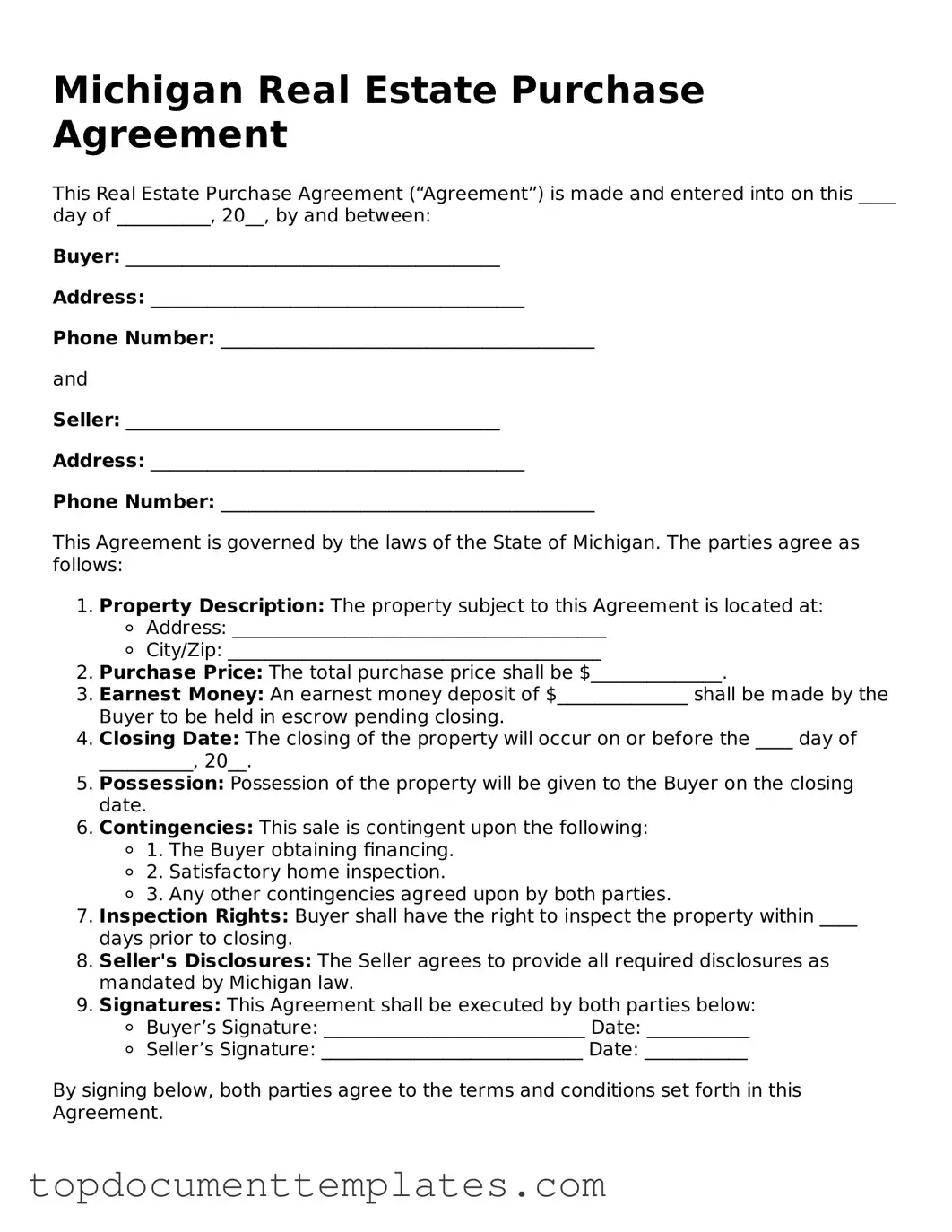Valid Real Estate Purchase Agreement Form for Michigan State
The Michigan Real Estate Purchase Agreement form serves as a critical document in the real estate transaction process, outlining the essential terms and conditions agreed upon by both the buyer and the seller. This form typically includes vital information such as the purchase price, the property’s legal description, and the closing date, ensuring that both parties have a clear understanding of their obligations. Additionally, it addresses contingencies that may affect the sale, such as financing requirements or inspections, which provide necessary protections for buyers. The agreement also delineates the responsibilities of each party, including disclosures related to property condition and any applicable warranties. By establishing a framework for negotiation and outlining the steps leading to the final transfer of ownership, this form not only facilitates smoother transactions but also serves as a legal safeguard for both buyers and sellers. Understanding its components and implications is crucial for anyone involved in real estate dealings in Michigan.
Similar forms
Lease Agreement: This document outlines the terms under which a tenant can occupy a property. Like the Real Estate Purchase Agreement, it details the parties involved, property description, and financial obligations. However, it is typically for a fixed period and does not transfer ownership.
Option to Purchase Agreement: This document gives a potential buyer the right to purchase a property at a later date. Similar to a Real Estate Purchase Agreement, it includes terms like price and duration but does not require immediate sale.
Last Will and Testament: This essential legal document outlines your wishes regarding asset distribution, guardian appointments for minor children, and executor designations. For more information, visit documentonline.org/blank-last-will-and-testament.
Seller’s Disclosure Statement: This form requires the seller to disclose known issues with the property. While the Real Estate Purchase Agreement focuses on the sale terms, the disclosure statement ensures the buyer is aware of any potential problems before finalizing the purchase.
Real Estate Listing Agreement: This document is between a seller and a real estate agent, authorizing the agent to market the property. It shares similarities with the Real Estate Purchase Agreement in that it establishes the terms of a transaction, but it does not finalize the sale.
Guidelines on Writing Michigan Real Estate Purchase Agreement
Once you have the Michigan Real Estate Purchase Agreement form in front of you, it’s time to start filling it out. This form is essential for any real estate transaction in Michigan. Follow these steps carefully to ensure that all necessary information is accurately provided.
- Begin by entering the date at the top of the form.
- Identify the parties involved. Fill in the names and addresses of the buyer(s) and seller(s).
- Provide a description of the property being sold. Include the address and any relevant details about the property.
- Specify the purchase price. Clearly state the total amount the buyer agrees to pay.
- Outline the terms of the sale. Include information about deposits, financing, and any contingencies.
- Indicate the closing date. This is when the transaction will be finalized.
- Include any additional terms or conditions that may apply to the sale.
- Both parties should sign and date the agreement at the end of the form.
After completing the form, review it for accuracy. Make sure all information is correct and that both parties have signed. This agreement will guide the transaction moving forward.
File Information
| Fact Name | Description |
|---|---|
| Purpose | The Michigan Real Estate Purchase Agreement is used to outline the terms and conditions of a real estate transaction between a buyer and a seller. |
| Governing Law | This agreement is governed by the laws of the State of Michigan. |
| Parties Involved | The agreement identifies the buyer(s) and seller(s), ensuring clarity on who is involved in the transaction. |
| Property Description | A detailed description of the property being sold is included, covering the address and any relevant legal descriptions. |
| Purchase Price | The total purchase price of the property is specified, along with any earnest money deposit required. |
| Contingencies | Common contingencies, such as financing, inspections, and appraisal, are outlined to protect both parties. |
| Closing Date | The agreement states the anticipated closing date, which is the date when the property transfer will occur. |
| Disclosures | Michigan law requires sellers to disclose certain information about the property, which is addressed in the agreement. |
| Signatures | Both parties must sign the agreement to make it legally binding, indicating their acceptance of the terms. |
Other Popular Real Estate Purchase Agreement State Forms
Georgia Purchase and Sale Agreement - It may outline any special conditions agreed upon by both parties.
Understanding the process of submitting a DA Form 31 is essential for Army personnel to ensure a smooth leave experience, and resources such as https://onlinelawdocs.com/ can provide valuable guidance on the requirements and best practices for completing this important form.
Contract to Purchase Real Estate - It can address how repairs will be handled before closing.
